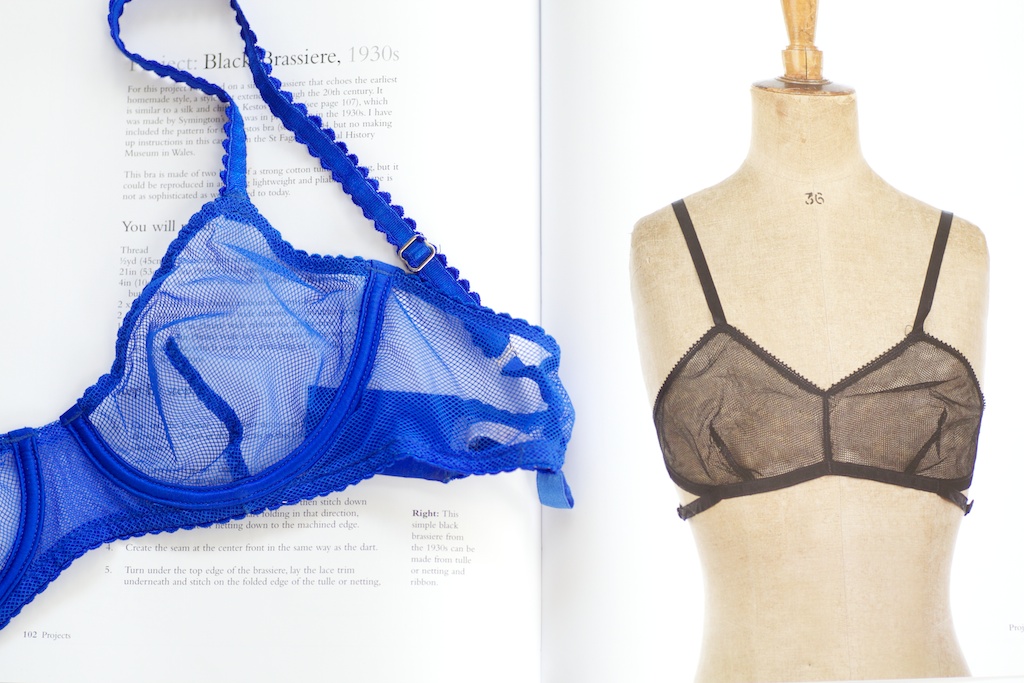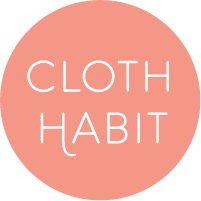[Last updated: August 2017]
Readers often ask me where to find a good book on bra-making. There aren’t many! Till very recently, bra making was a very niche craft even among passionate sewists. These days, however, you can find an explosion of ideas if you know where to look. There are loads of great blogs with bra sewing techniques that far surpass what you can find in books along with online classes.
And yet despite the internet of ideas, it’s nice to have a good book by your side. I’m a fan of books! I like writing in margins, roughing up spines and sometimes having quiet arguments with an author’s technique.
So here’s a list of books I have in my library, all of which cover bra sewing techniques in some form, along with my short thoughts on each.
(I’ve decided not to include books that are *only* about patternmaking for bras–not that there are many!–as I tend to think of patternmaking and construction/sewing as two different subjects. All the books below cover sewing techniques, and a couple of them also happen to include patternmaking.)
Books for Structured Bra Making
The following are all books that can help you learn to make both wired and soft cup bras using cup sizes.
Bra-makers Manual by Beverly Johnson
If I were to recommend just one book for bra-making this would be it. Beverly Johnson has been a leader in the field of custom bra-making and bra patterns for home sewists. Although it has some industry-know-how information, the audience for this book is for the home sewist or custom bra-maker. What you will find inside:
- a little bit of bra history
- bra sizing and measuring
- instructions for how to sew both partial and full band bra styles
- chapter on specialty bras (masectomy and strapless styles)
- chapter on fit alterations
- chapter on style manipulations
Once you understand the basics or bra making and fitting, which this book amply covers, it’s easy to make many informed choices on your own. What I didn’t pick up from this book, I learned by studying other bras or experimenting on my own.
Strengths: Fitting and style alterations (worth the entire price of this book!), cheerful personal tone, thorough detail on construction techniques, well organized chapters.
Weaknesses: Not a “pretty” book and some of the photographed bras don’t appeal to me, but design is not the point of this book.
Bra-Makers Manual II by Beverly Johnson
This book expands on the first volume. The first third includes some tips for special fitting needs, along with an extensive chapter on the “whys” of bra sizing and grading. These parts may be of interest to the custom bra-maker or those analytical sewists who want to better understand the “whys”.
There is also a a chapter on drafting a custom bra from measurements, and this is a far better method than the one demonstrated in her first book. The rest of the book, and its bulk, is devoted to lace application and sewing foam cup bras. There is a lot of great information here for the novice and experienced bra-maker.
Strengths: analysis of bra sizing in RTW, same personal tone and thorough explanations of technique, good discussion of tools used in industrial applications vs. home sewing machines.
Weaknesses: No encouragements on accuracy in cutting or patternmaking. The adjustment illustrations use bulky lines which makes the patternmaker in me squirm! (Big bulky marker lines lead to inaccurate measurements. I need sharp, sharp pencils and hard paper!)
Bare Essentials: Bras by Jennifer Lynne-Fairbanks
This book and its sister volume, Bare Essentials: Underwear, are fantastic little introductions to bra and underwear making. If you want a resource that gets you started in both drafting and sewing bras without the price tag of some of my other recommendations, this is it.
What’s included: Basics on bra materials and elastics, basic techniques for constructing a full band bra, techniques for a few style alterations to bra cups, and a method for drafting a full-band bra . All of this is very well-illustrated.
As a bonus for those who aren’t interested in drafting, the book includes a basic horizontally-seamed bra pattern in many sizes. Unfortunately there are no fitting techniques, but this book’s main strength is in its patternmaking technique which I’ll discuss further down this post.
Strengths: Drafting techniques, clear illustrations, bonus patterns.
Weaknesses: No fitting techniques.
Geek note: There are detailed charts for calculating stretch reductions for fabrics and elastic in both the bra and underwear books. Some users will find these charts extremely helpful, as stretch reduction (i.e., negative ease) is usually missing in other lingerie patternmaking books.
As a caveat, I personally find the reductions to be far too tight compared to standards in ready-to-wear, especially for the elastic. I prefer to test each elastic in sewing and use no more than 8% reduction and in some cases, none at all.
Demystifying Bra Fitting and Construction by Norma Loehr
This book fills a welcome niche in bra-making. Its intended audience is the home bra maker rather than the professional—be they a design student or custom bra maker. As such, the focus of the book is on developing one’s own personal “master pattern”, and its a nice book for beginners in bra-making.
It walks through the construction techniques that she uses for her own bras, along with a formal but encouraging tone that beginners may find helpful. A strength of this book is in her explanations of materials and her advice to cut or bend wires as needed. There is a little bit of fitting information, but most of its focus is on materials and construction.
You will not find much analysis of bra fit or measuring, and all of the fitting techniques in this book are a part of both Bra-makers Manuals so it doesn’t contain any new information on that front. But if the price tag of those books scares you off, and you want a more personal approach, this book is a friendly start!
Strengths: Easy to follow construction methods.
Weaknesses: little fitting techniques, could use better photos and diagrams.

Vintage and Soft Bra Making
The following books also cover some aspects of bra-making. I’m including them because they might be of interest to the collector or vintage-lovers out there!
Many of them are focused on what I call “soft wear lingerie”, which include garments like camisoles, tap pants, slips, and woven soft cup bras. Garments of this type do not rely heavily on special materials for fit, and as such they are easier for beginners to learn.
Keep in mind that older books about stretch lingerie and structured bras use materials and ideas about stretch fabrics that were available at the time of publication, but are often a little outdated.
Vintage Lingerie by Jill Salen
I previously reviewed this book here. Jill Salen is a costume designer and this book peeks inside her collection of vintage lingerie, with some construction techniques. This is a must-have for any sewing book collector or someone who wants to study vintage lingerie techniques. (Her Vintage Swimwear book is equally gorgeous.)
Easy to Sew Lingerie by Threads editors
Available both as a paperback and pdf download. More like a booklet, this has a small section on sewing underwired bras. This section was probably republished from Threads Magazine articles, which you can find here by Cynthia Elam, the former designer of Elan Patterns.
Sewing Lingerie that Fits by Karen Morris
Published by the Threads Magazine press, this book has a chapter on bra-making using either a copied pattern or one of the then-popular underwired bra patterns (Kwik Sew and Elan). Some of the methods are a little outdated.
Lingerie Secrets by Jan Bones
Mostly about sewing soft wear lingerie, but there is a chapter on making a soft bra.
The Secrets of Sewing Lingerie
This new book by two lingerie designers is lovingly photographed and full of design inspiration. The garments in this book are all soft wear lingerie with a heavy focus on boudoir-ish design. As such the bra patterns and their techniques are more decorative than than supportive but some of the techniques are helpful for anyone wanting to work with silk or lace application.
